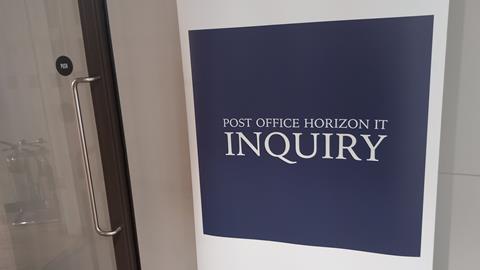A lawyer on a Post Office Horizon prosecution was never told that the case was thrown out as a ‘sham’ by the judge, the statutory inquiry has heard.
Kevin Shiels was the ‘directing officer’ handling the case who approved the decision to prosecute Maureen McKelvey, a sub-postmistress in Omagh, Northern Ireland, following evidence gathered by the Post Office.
McKelvey’s case had been allocated to the Department of Public Prosecutions in Northern Ireland in 2004 – making it one of the first prosecutions in the UK based on data from the Horizon IT system.
The public inquiry yesterday heard that the trial judge acquitted McKelvey of theft after a trial in 2006, describing the Post Office case against her as a ‘sham’.
But despite similar prosecutions continuing in Northern Ireland and the rest of the UK, Shiels said he was not told about the outcome of the case and that there was no review by the DPP.
‘If the judge made those comments, I would expect a review to be carried out,’ he said. Asked whether if a review might have revealed that the Post Office held back information from the public prosecutor, Shiels said: ‘Yes, I would agree with that.’
Counsel further asked Shiels whether such a review might have changed how investigations involving the Post Office were handled in the future. The lawyer replied: ‘Possibly yes, possibly.’
In her witness statement to the inquiry, McKelvey said she was ‘mentally and physically broken’ by how she was treated, her body broke down from the stress and she started having anxiety attacks. She estimated that, after the introduction of Horizon, she paid between £25,000 and £30,000 to cover shortfalls which appeared on the system in order to continue trading.
She constantly rang the helpline to report issues but was told by the Post Office that no-one else was experiencing these problems. Despite being acquitted of any charges, she was forced to sell her business due to the stress and financial pressure and lost her reputation in her local community.
In his evidence, Shiels accepted that the Post Office investigation report handed to him did not sufficiently address the possibilities of human or computer error for shortfalls on the system. He was also never shown helpline call logs of problems reported by McKelvey and said that if he had known then he would have reassessed whether the prosecution test was met.
During her interview with investigators, McKelvey did raise the issue of whether there might have been a computer error, but this was not mentioned in the subsequent report to prosecutors.
The inquiry continues.































